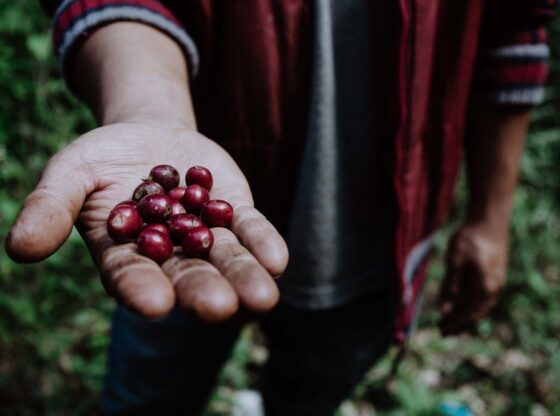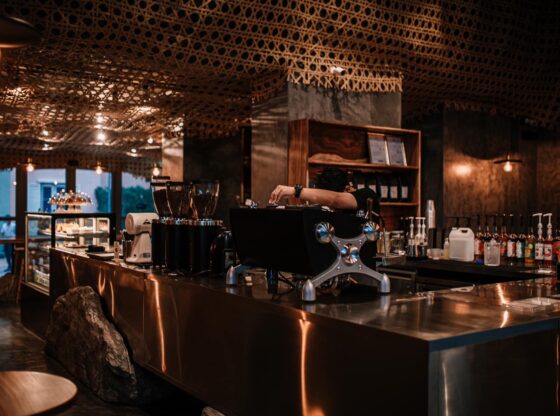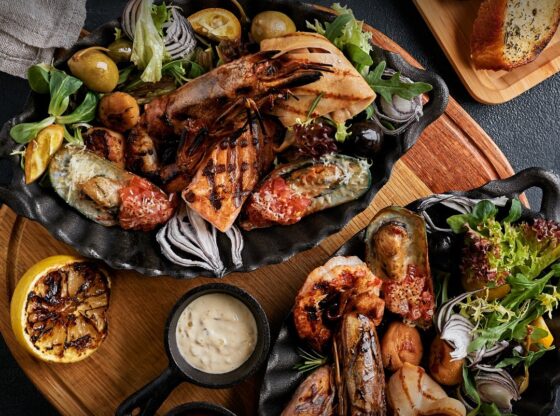![]()
Well intentioned ideas may cause problems elsewhere
From next month (January) some of the biggest names in Thai retailing are planning to stop handing you your purchases wrapped in single-use plastic bags.
They are to be applauded.
Among the companies who have signed up to the programme are CPALL Plc, which operates more than 10,000 7-11 stores in the country. The other big name is the Central Group, which dominates the department store scene.
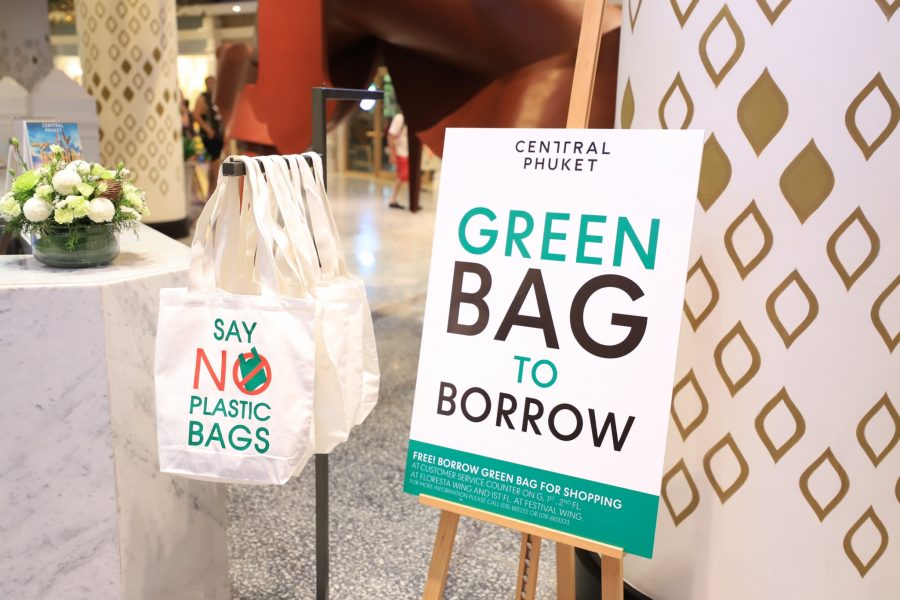
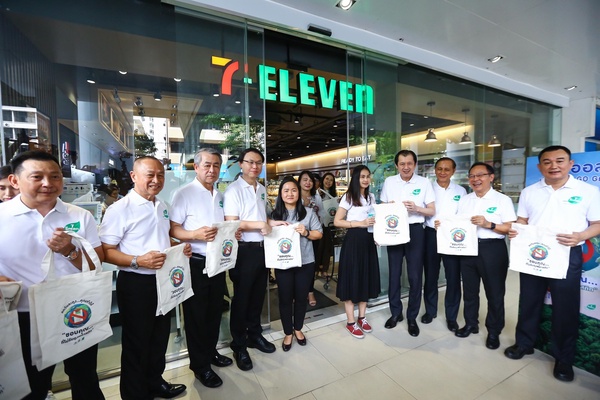
I repeat, they are to be applauded. Having seen some pictures and social network videos of marine life hopelessly entrapped by plastic you would find it difficult to do anything other than give them a big thumbs up.
But I wish to sound a cautionary note. I don’t for one minute doubt their sincerity, but the reality may not live up to the promise.
Here, in the UK, we have been trying for many years to overcome the plastic problem. One of the initial moves was to introduce a charge for the plastic bags handed out in supermarkets – 5p (about two baht). This worked well, but only to an extent. People started reusing the bags they had paid for rather than leave them at home and keep on paying the money. Alternatively, they started buying more permanent non-plastic bags to take with them when they shopped.
So far, so good. But the eco experts worked out this was not achieving enough. The next step was to up the ante. Major retailers, such as Waitrose, opted to scrap the 5p bag. You can still buy a bag, but the price has been upped to four times the original. This happened comparatively recently so the jury is still out on the effectiveness of the move.
But, whatever the cost of the bag, these charges have had an unfortunate side-effect.
An unforeseen factor behind the supermarket plastic bag charge means some people are buying more single-use plastic bags.
It’s the kind of thing that makes you slap your forehead with frustration, one of the UK’s top waste and recycling companies says, and it’s all because of a thrifty habit the Brits still haven’t shaken off.
What everybody who supported the plastic bag charge levied on supermarket customers forgot is that millions of people were in the habit of using their supermarket carrier bags as bin bags. In effect, they were not really single-use.
“And as one study has found,” BusinessWaste.co.uk spokesperson Mark Hall says, “the cut in supermarket bags is now being offset by people buying more plastic rubbish sacks.”
Wait… that can’t be right, can it?
BusinessWaste quotes the numbers experienced in one American state. According to a study published in a scientific journal earlier this year, the author concluded that in the US state of California, where single-use plastic supermarket bags are banned and shoppers have to pay 10 cents for a paper sack:
• Some 20,000 tons of plastic supermarket bags were eliminated, but…
• This was offset by Californians buying an additional 6,000 tons of rubbish bags and refuse sacks
The logical conclusion from this is that nearly a third of people were using their shopping bags as bin bags, and they needed something else to hold their rubbish.
“This is the law of unintended consequences in action,” says BusinessWaste.co.uk ‘s Mark Hall, “and while there’s still a big decrease in the amount of plastic being used, it’s something nobody even thought would happen”.
That’s America. But what about the UK?
BusinessWaste.co.uk carried out its own survey of 1,500 households and found that:
• 470 households were buying extra rubbish bags instead of using supermarket plastic bags
• All put it down to the fact that supermarket carrier bags “cost money” and they don’t want to waste them by throwing them in the bin.
In fact, delving deeper showed that people tended to buy smaller rubbish bags, because – to quote one householder: “Shop bags were just the right size for our bedroom and bathroom bins, and you just can’t get them for free any more.”
But what of Thailand?
Well, it may not surprise you to know that finding figures isn’t easy. But maybe we don’t need statistics. Stop a minute and consider your own life in Thailand.
How often do you find yourself carrying a plastic bag?
Street food is served in them as are on-the-run soft drinks. In 7-11s up until now I recall everything I ever bought was handed to me in a plastic bag. Even perfectly wrapped confectionery would have the addition of a plastic bag. They bagged things whether the item needed a bag or not.
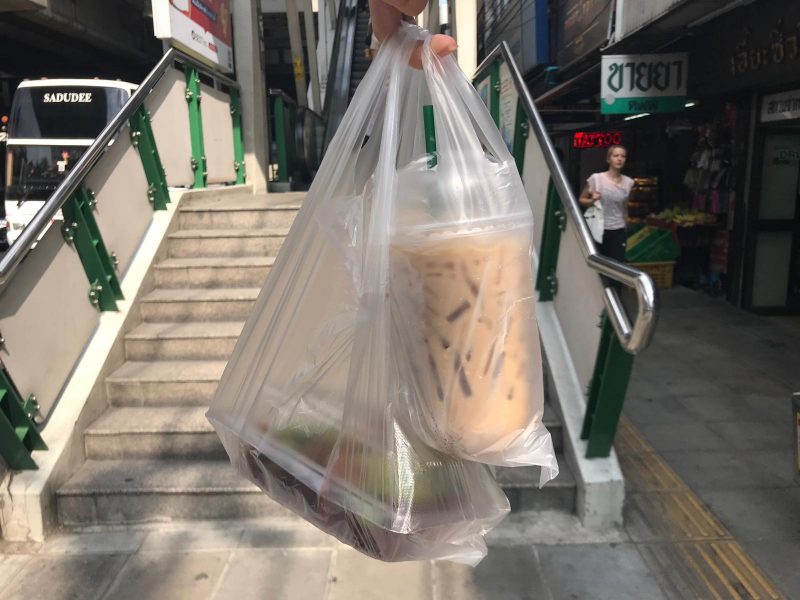
Greenpeace has some damning figures relating to Thailand and plastics. The environmental group says some 75 billion pieces of plastic bags end up in the waste each year in the country and half of this is from malls, supermarkets, and convenience stores, with the other half coming from traditional markets and street vendors. These bags are part of almost two million tonnes of plastic waste produced each year by Thai consumers.
Do Thai people and the ex-pats living there make more use of the plastic bags they receive now like the Brits with their bin liners? My hunch is the answer is a big “yes”. When living on the Dark Side, my experience was that my wife never wanted to throw them away. Many was the time when looking under the sink for the dishwashing liquid I wouldn’t be able to spot anything due to the sheer volume of the plastic bags stored (make that bunged) there. Sound familiar?
My feeling is that it is going to take Thailand many years – decades even – to bring its plastic bag habit under control. Though, that said, there’s no justification for shrugging, conceding defeat and doing nothing.
No plastic bags in 7-11s will, alone, be an amazing start. And, as the old adage goes… you’ve got to start somewhere!
By Dave Buckley







